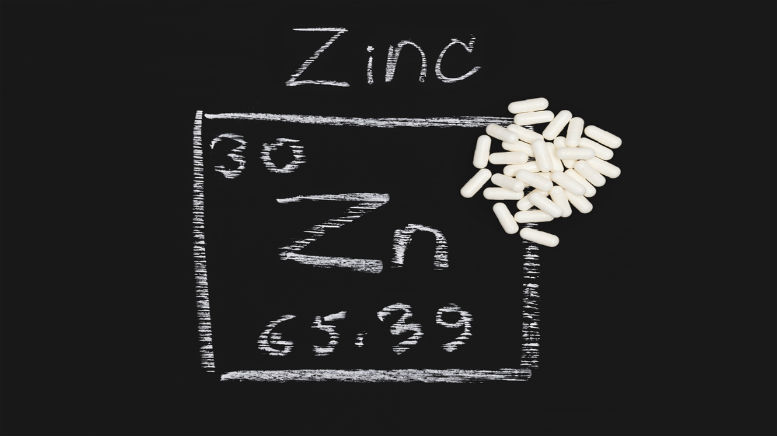New research from the Westmead Institute’s Storr Liver Center and the Center for Virus Research and Kirby Institute suggests that zinc might be able to fight liver disease in ways never imagined.
The study, led by Dr. Scott Read and Associate Professor Golo Ahlenstiel, found that the trace mineral could fight liver disease by restraining the inflammatory effects of the interferon lambda 3 protein (IFN-λ3). Published in Nature Communications, these findings confirm that zinc is a specific inhibitor for the IFN-λ3 protein, especially when it comes to viral infections such as hepatitis C and influenza. Many consider this to be a breakthrough discovery as IFN-λ3 is a protein that is linked to tissue damage in chronic liver disease. Additionally, the IFN-λ3 lessens antiviral activity and increases the chances of viral replication in-vivo and in-vitro.
When asked about the discovery, Dr. Read stated, “We have demonstrated that zinc inhibits numerous facets of the liver’s immune response to viruses that may be mediated by IFN-λ3.” Elaborating further, Dr. Read noted that zinc has the ability to block IFN-λ3’s inflammatory activity, which has a strong correlation to the progression of cirrhosis in both viral and non-viral liver disease.
As reported by Dr. Read, the team’s findings “suggests that serum zinc levels in patients with chronic hepatitis C are genetically predetermined by the IFN-λ3 polymorphism, confirming the inhibitory role of zinc in vivo. The data highlights the potential for zinc to be used as a simple and effective treatment against acute and chronic inflammation in the liver.”
The liver is the largest organ in the body, found directly under the ribs on the right side of the body. Liver disease can be anything from cirrhosis to hepatitis to liver cancer and according to the Liver Center of Saint Louis University, it is the 12th leading cause of death in the United States, following closely behind suicide and blood poisoning. As of right now, there are more than 20 liver diseases that have been diagnosed. Even though there are treatments available for those living with liver disease, these will only slow down the advancement of the disease, not cure it. It has been estimated that 15,000 Americans die from either liver cancer or chronic liver disease associated with viral hepatitis, according to the Center for Disease Control and Prevention.
However, thanks to the latest discovery, patients diagnosed with liver disease can now develop an optimistic mindset as zinc is found in a number of foods that we eat. Zinc, a key trace mineral, plays a defining role in synthesizing protein and maintaining cell production in the immune system. Zinc can be condensed in the strongest muscles in the body or in areas such as the skin, liver, eye retina, white and red blood cells, pancreas, and bones. The mineral can also be found in the prostate gland or semen. As mentioned, the study’s findings prove that the mineral has the potential to become an effective treatment for both acute and chronic liver inflammation.
The trace mineral is needed for a number of functions in the body. In fact, there are more than 300 enzymes that require zinc to operate normally. Those who don’t consume enough zinc in their diet are at risk of developing a deficiency in zinc which can lead to a variety of symptoms. These symptoms include the following: depression, loss of smell and taste senses, loss of appetite, low blood pressure, fatigue, hair loss, growth retardation, diarrhea, rough/pale skin, and white spot formation under the fingernails.
Furthermore, zinc deficiency is linked to liver cirrhosis. There are a number of studies that prove that zinc supplementation can help to improve neurological systems and malnutrition seen with liver diseases. Not only that but many speculate that it will help aid in fending off chronic and acute liver diseases. It doesn’t end there however. Studies have shown that zinc supplementation can help manage liver diseases caused by alcohol by inhibiting the formation of free oxygen radicals as well as bettering antioxidant pathways.
Of course, there are ways to forestall liver problems. Health experts suggest that you avoid the use of drugs and alcohol, use medication sensibly, get regular vaccinations, and maintain a healthy diet. It’s the little things that go a long way in this life, and this includes having a healthy amount of zinc in your diet. By including zinc in your diet, you can improve your immune system and promote faster healing of wounds. If you’re looking to include more zinc in your diet, try eating the following: lobsters, crabs, meat, oysters, poultry, legumes, vegetables (mushrooms and broccoli are the top choice), whole grains, milk, and dairy.
Featured Image: DepositPhotos/© phasinphoto











